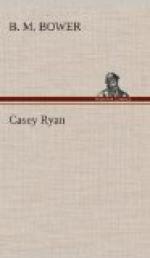“And what,” she asked coldly, “had you been drinking, Mr. Ryan?”
“Me? One bottle of lemon soda before I left town, and I left town at three o’clock in the afternoon. I swear—”
“You need not swear, Mr. Ryan.” The widow folded her hands and regarded him sternly, though her voice was still politely soft. “After I had told you repeatedly that my little ones should ever be guarded from a drinking father; after you had solemnly promised me that you would never again put glass to your lips, or swallow a drop of whisky; after that very morning renewing your pledge—”
“Well, I kept it,” Casey said, his face a shade paler under its usual frank red. “I swear to Gawd I was sober.”
“You need not lie,” said the widow, “and add to your misdeeds. You were drunk. No man in his senses would imagine what you imagine, or do what you did. I wish you to understand, Mr. Ryan, that I shall not marry you. I could not trust you out of my sight.”
“I—was—sober!” cried Casey, measuring his words. Very nearly shouting them, in fact.
The widow turned pointedly away and began to stir something on the stove, and did not look at him.
Casey went out, climbed the hill to his Ford, cranked it and went larruping down the hill, out on the lake and, when he had traversed half its length, turned and steered a straight course across it. Where tracings of wheels described a wide circle he stopped and regarded them intently. Then he began to swear, at nothing in particular, but with a hearty enjoyment of the phrases he intoned.
“Casey, you sure as hell have had one close call,” he remarked, when he could think of nothing new and devilish to say. “You mighta run along, and run along, till you got married to her. Whadda I want a wife for, anyway? Sour-dough biscuits tastes pretty good, and Casey sure can make ’em!” He got out his pipe, filled it and crammed down the tobacco, found a match and leaned back, smoking with relish, one leg thrown over the wheel.
“A man’s best friend is his Ford,” he exclaimed. “You can ask anybody.” He grinned, and blew a lot of smoke, and gave the wheel an affectionate little twist.
CHAPTER V
Some months later Casey waved good-by to the men from Tonopah, squinted up at the sun and got a coal-oil can of water, with which he filled the radiator of his Ford. He rolled his bed in the tarp and tied it securely, put flour, bacon, coffee, salt and various other small necessities of life into a box, inspected his sour-dough can, and decided to empty it and start over again if hard fate drove him to sourdough.
“Might bust down and have to sleep out,” he meditated. “Then, agin, I ain’t liable to; and if I do, I’ll be goin’ so fast I’ll git somewhere before she stops. I’m—sure—goin’ to go!”
He cranked the battered car, straddled in over the edge on the driver’s side and set his feet against the pedals with the air of a man who had urgent business elsewhere. The men from Tonopah were not yet out of sight around the butte scarred with rhyolite ledges before Casey was under way, rattling down the rough trail from Starvation Mountain and bouncing clear of the seat as the car lurched over certain rough spots.




